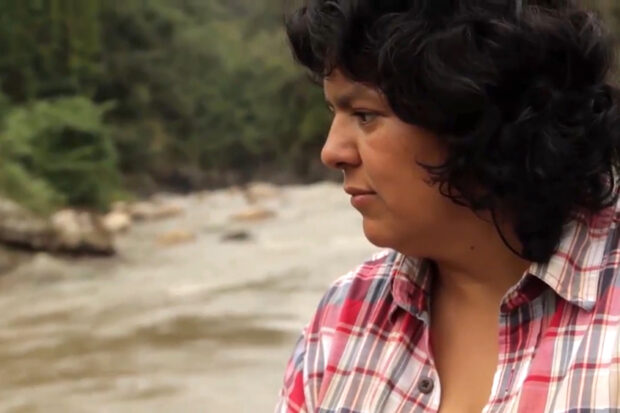
Berta Cáceres was killed on March 3, 2016, one day before what would have been her 45th birthday. Cáceres was an Indigenous Lenca woman in Honduras who co-founded the COPINH—Consejo Cívico de Organizaciones Populares e Indígenas de Honduras (The Civic Council of Popular and Indigenous Organizations of Honduras)—to fight for Indigenous rights and territories.
The Indigenous community fought the Agua Zarca dam and project for many years and they were effective in community organizing and in getting international attention. Cáceres won the Goldman Environmental Prize in 2015.
Cáceres spent her life in the struggle. In addition to her environmental and Indigenous activism, she fought for women’s liberation. She fought against the 2009 military coup in Honduras that overthrew elected centrist President Manuel Zelaya. This coup was supported by the United States, trying to build a right-wing dictatorship state in Honduras.
In December 2019, the triggermen—seven of them—were sentenced to prison for the murder. Of the seven men arrested for the murder initially, three were linked to the U.S.-trained elite military troops: Two had been trained at Fort Benning, Ga., the former School of the Americas (renamed WHINSEC). Graduates of this U.S. “school” have committed thousands of murders, tortures and other human rights violations in Latin America.
Roberto David Castillo Mejía, a planner and instigator of the murder of Cáceres, was finally convicted in July 2021, more than five years after the crime. In 2022, he was sentenced to 22 years in prison.
Castillo was president of the private energy company Desarrollos Energéticos SA (DESA), developers of the Agua Zarca hydroelectric project. This project was planned to go through the territory of the Indigenous Lenca people without their consent.
But he’s not just a company president. He is also a former Honduran military intelligence officer who was trained at West Point, and a former National Electrical Energy Company employee, who was able to exert illegal influence on government contracts and get the help of the government security forces for his actions, including human rights abuses, most notably murder.
But everyone has known that there was yet another higher level of wealth and power implicated in this particular killing.
Now Honduran authorities have issued an arrest warrant for another person involved in the planning and payoff of the Cáceres murder. The Public Ministry examined the phone communications that implicated Castillo and found forensic evidence implicating Daniel Atala Midence, the former financial manager of the hydroelectric company DESA. Atala Midence’s father and two uncles are the majority shareholders in the dam company. The Atala family is one of the richest in Honduras.
Cáceres was assassinated precisely because she led the fight against DESA’s massive hydroelectric dam on a river in southwestern Honduras that’s sacred to the Lenca people. After the U.S.-sponsored 2009 coup overthrew the elected president and installed a right-wing government, the dam project on the Gualcarque river was approved even though it had not complied with national and international environmental and community requirements.
Cáceres’s oldest daughter, Olivia Zúñiga Cáceres, is the Honduran ambassador to Cuba. Her statement was concise: “Acompáñennos una vez más por favor, orando porque la justicia llegue a quien deba llegar” (“Be with us once more, please, as we pray that justice will come to those who deserve it”).
Berta Zúniga Cáceres, another daughter who currently heads the COPINH, has said that “everyone in the criminal organization involved in this crime should be brought to justice,” referring to the Atala family.
Gustavo Castro Soto, a Mexican environmental leader, was the only witness to the murder of Berta Cáceres. He was also shot in the attack and survived only because the attackers thought he was dead.
“Justice has only been half-done because finally those who planned, executed, bought the perpetrators and paid them off are free,” says Castro Soto. “These are the members of the Atala family, one of the richest in Honduras; they are the intellectual authors.”
Bringing Atala to justice is something that could not have happened under the corrupt right-wing governments installed after the U.S.-sponsored coup in 2009.
Current President Xiomara Castro is a businessperson who became involved in the National Resistance Front after the coup deposed her husband Manuel Zelaya. She was elected president on the LIBRE party ticket and assumed office in 2022.
In her inaugural speech, President Castro called for “justice for Berta Cáceres.” She has banned open pit mining, applied for membership in the New Development (BRICS) Bank, implemented a plan in which the poorest families in Honduras will no longer pay electric bills and their costs will be assumed by a surcharge on the largest consumers of electricity, recognized the Chinese and Venezuelan governments, and recalled the Honduran ambassador from Israel on Nov. 4, stating that “Honduras energetically condemns the genocide and serious violations of international humanitarian law that the civilian Palestinian population is suffering in the Gaza Strip.”
Two notes in conclusion:
Given the history of Latin-American center-left governments, it is clear that the Xiomara Castro government is and will be a target for overthrow. The problem is that people can hope for better and elect progressive presidents, but other fundamental institutions remain under the control of the same rich powerful forces that oppose change. The economy, the communications media, the judiciary, the legislature, organized crime and the military are all means that can be exploited and manipulated so that the rich and the United States can maintain control of the country.
“Lawfare” or false charges, legislative coups, deliberate economic sabotage and massive media campaigns of disinformation have become common methods of manipulation and exploitation, along with the tried and true tactic of military overthrow of an elected government.
So far in Honduras, the legislative path to overthrow was tried at the outset of her term of office, and the economic sabotage was attempted when the country’s electrical supply, under the control of a few oligarchical families, mysteriously failed last July. Having lived through one coup, Castro knows the risks, but knowledge is not always sufficient.
It seems miraculous that even one member of the family that planned and financed the murder of Berta Cáceres might finally be brought to justice. These conspirators were so confident of impunity that they made no attempt to disguise their involvement or conceal their phone message group as they arranged murder plotting and money transfers for payoffs. So far, the warrant has been issued but no actual detention has occurred, much less a trial. Please stay alert for news.

